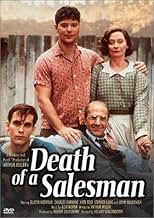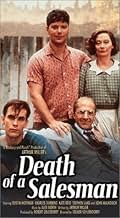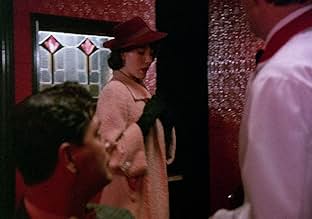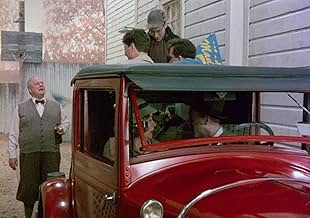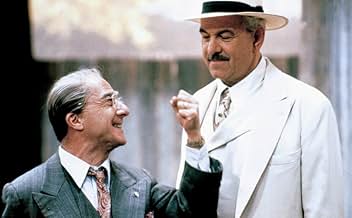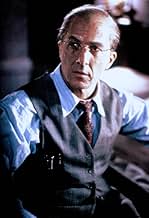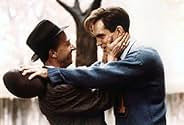IMDb RATING
7.2/10
12K
YOUR RATING
An aging traveling salesman recognizes the emptiness of his life and tries to fix it.An aging traveling salesman recognizes the emptiness of his life and tries to fix it.An aging traveling salesman recognizes the emptiness of his life and tries to fix it.
- Won 3 Primetime Emmys
- 7 wins & 12 nominations total
David Chandler
- Bernard
- (as David S. Chandler)
Kathryn Rossetter
- Woman from Boston
- (as Kathy Rossetter)
Featured reviews
'Death of a Salesman' is a well-made, well-told story, but above it's merits as a story, it's the performances by it's actors, Dustin Hoffman & John Malkovich, that stand out & shine the brightest.
'Death of a Salesman' Synopsis: An aging traveling salesman recognizes the emptiness of his life and tries to fix it.
Based on the 1949 play of the same name by Arthur Miller, 'Death of a Salesman' succeeds by becoming an absorbing cinematic tale as well. It efficiently structures the story of an aged man, who is on the verge of killing himself. The Writing Material is engaging & very human, if I may say so. Volker Schlöndorff Directs this story, with maturity.
Hoffman & Malkovich, as mentioned before, stand out with their performances & shine the brightest, they overshadow the narrative, to a large extend. Hoffman is astonishing as an aging traveling salesman, while Malkovich is magnificent as his troubled son. They both deliver legendary, unforgettable performances, that deserve immense praise. Among other performers, Kate Reid does exceedingly well as the wife of the salesman.
On the whole, A story worth watching, with 2 impeccable performances coming in-tact with it.
'Death of a Salesman' Synopsis: An aging traveling salesman recognizes the emptiness of his life and tries to fix it.
Based on the 1949 play of the same name by Arthur Miller, 'Death of a Salesman' succeeds by becoming an absorbing cinematic tale as well. It efficiently structures the story of an aged man, who is on the verge of killing himself. The Writing Material is engaging & very human, if I may say so. Volker Schlöndorff Directs this story, with maturity.
Hoffman & Malkovich, as mentioned before, stand out with their performances & shine the brightest, they overshadow the narrative, to a large extend. Hoffman is astonishing as an aging traveling salesman, while Malkovich is magnificent as his troubled son. They both deliver legendary, unforgettable performances, that deserve immense praise. Among other performers, Kate Reid does exceedingly well as the wife of the salesman.
On the whole, A story worth watching, with 2 impeccable performances coming in-tact with it.
A generation after Lee J. Cobb originated the role on stage and Fredric March did
the big screen version, Dustin Hoffman does a really great job as Willy Loman in
Death Of A Salesman in a made for television version. It's a bit more surreal than
the others but Arthur Miller's message about misplaced values certainly gets
across.
All poor Willy Loman wanted to be was be liked and that to him became a creed. It's how you sell your product, it's how you sell yourself. He loved his family, but he was always 'on'. And forever envious of brother Ben who went out and took risks but saw the world.
Hoffman was years younger than March or Cobb, but with makeup he certainly looks the part. Kate Reid plays the wife and John Malkovich and Stephen Lang are sons Biff and Hap. They really function well as the Loman family unit and the chemistry is real.
Seeing how much purchasing is now done on line, I wonder if a lot of the message of Death Of A Salesman will be lost in the future. An audience in the future might not know what a salesman is or does as personal contact in buying and selling becomes less and less.
I certainly hope not.
All poor Willy Loman wanted to be was be liked and that to him became a creed. It's how you sell your product, it's how you sell yourself. He loved his family, but he was always 'on'. And forever envious of brother Ben who went out and took risks but saw the world.
Hoffman was years younger than March or Cobb, but with makeup he certainly looks the part. Kate Reid plays the wife and John Malkovich and Stephen Lang are sons Biff and Hap. They really function well as the Loman family unit and the chemistry is real.
Seeing how much purchasing is now done on line, I wonder if a lot of the message of Death Of A Salesman will be lost in the future. An audience in the future might not know what a salesman is or does as personal contact in buying and selling becomes less and less.
I certainly hope not.
The salesman of the title is Willy Loman, a man in his early sixties, approaching retirement. Despite his long service, travelling from his New York base all over New England in the service of his employers, he has never enjoyed great success in his job. He is in financial difficulties, struggling to pay the mortgage on his house and the instalments on the consumer goods- refrigerator, vacuum cleaner, car- which were becoming popular in the forties but which represented a major commitment, even in middle class households. In order to make ends meet, he has taken to borrowing from his old friend Charlie.
His sense of failure, however, does not derive solely from his unsuccessful career. He also sees himself as having failed in his private life. Although his marriage to his loyal wife Linda has survived, despite the fact that he has on occasions been unfaithful to her, his relationships with his two sons are strained. Biff, the elder, showed promise when young in both the academic and sporting fields, but failed to win a place at university after failing a maths exam at school, and since has become a rootless drifter, alternating between dead-end jobs and petty crime. Biff has been particularly alienated from his father since discovering one of Willy's affairs. Happy, the younger, has been more successful than Biff in his career, but in his private life is a selfish, cynical womaniser.
Willy is much given to violent mood swings, alternating between exuberant over-optimism and despairing pessimism. The younger Willy's optimism was largely focused on his own career, believing that he had a talent for making himself "well liked" which would lead to a brilliant career. The older Willy's hopes are mostly focused on his sons, especially Biff, whom he still believes (in the teeth of all the evidence) to be capable of great things. When his son disappoints him, Willy turns on him fiercely, accusing him of being a "lazy bum". Biff's lack of success in life does indeed derive partly from his own weaknesses, but Willy's unrealistic expectations are also partly to blame; Biff would probably be happiest working with his hands, but Willy tries to pressure him into taking a white-collar job.
The film follows the play in that on a number of occasions the action switches abruptly from the present into the past, as the characters act out episodes from earlier in Willy's life. Some of these episodes, in fact, may exist only in Willy's imagination, particularly those involving his wealthy older brother Ben, who is now dead although that does not prevent him from making several appearances. Ben, in fact, is not really a character in his own right, but rather functions as a symbol of the failures and missed opportunities in Willy's life.
At one time filmed versions of stage plays were done in a similar way to theatrical productions (the Marlon Brando/Vivien Leigh "A Streetcar Named Desire" from the early fifties is a good example), but in the seventies and eighties the general tendency was to "open them up" by filming on location as well as on studio sets, by taking liberties with the playwright's text, often making significant changes to the plot and even introducing extra characters. "Death of a Salesman", although it was made as late as 1985, has a very old-fashioned feel to it. It not only keeps Arthur Miller's plot unchanged, but also follows his text almost literally to the word. There is no attempt to open it up; it is filmed entirely on stylised, deliberately artificial-looking sets similar to those that would be used in a theatre.
Normally I would take the view that the cinema and the theatre are two different media and that one should not try to imitate the other. This film, however, was originally made for television and based on a Broadway production, and works better on the small screen than it probably would do on a big one. It is, in fact, a very good film, despite its old-fashioned, theatrical look. The main reason, apart from the quality of Miller's original play, is the quality of the acting. Dustin Hoffman called the role of Willy Loman his favourite acting experience; it is certainly one of his best, although not in my view his very best. (That remains "The Graduate"). He brings out all the complexities and contradictions in Willy's character, a man who is certainly difficult, perhaps even impossible, but at the same time also tragic and pitiable.
The play has been seen as a critique of the capitalist economy or of the American way of life. That is one possible interpretation, but there is more to it than that. It also deals with the plight of the elderly, especially those whom society no longer seems to value, with the human need, too often disappointed, to aspire to a better life, and with the gap between appearance and reality. On a more personal level it is also a character study and an exploration of the relationships within a family, especially father-son relationships. This means that the supporting cast has to be strong, and Hoffman certainly receives strong support, especially from Kate Reid as Linda, Charles Durning as Charley and above all from John Malkovich as Biff. The result was an excellent production that brought out the various levels of meaning in Miller's play as well as the tragedy of its central figure. 8/10
His sense of failure, however, does not derive solely from his unsuccessful career. He also sees himself as having failed in his private life. Although his marriage to his loyal wife Linda has survived, despite the fact that he has on occasions been unfaithful to her, his relationships with his two sons are strained. Biff, the elder, showed promise when young in both the academic and sporting fields, but failed to win a place at university after failing a maths exam at school, and since has become a rootless drifter, alternating between dead-end jobs and petty crime. Biff has been particularly alienated from his father since discovering one of Willy's affairs. Happy, the younger, has been more successful than Biff in his career, but in his private life is a selfish, cynical womaniser.
Willy is much given to violent mood swings, alternating between exuberant over-optimism and despairing pessimism. The younger Willy's optimism was largely focused on his own career, believing that he had a talent for making himself "well liked" which would lead to a brilliant career. The older Willy's hopes are mostly focused on his sons, especially Biff, whom he still believes (in the teeth of all the evidence) to be capable of great things. When his son disappoints him, Willy turns on him fiercely, accusing him of being a "lazy bum". Biff's lack of success in life does indeed derive partly from his own weaknesses, but Willy's unrealistic expectations are also partly to blame; Biff would probably be happiest working with his hands, but Willy tries to pressure him into taking a white-collar job.
The film follows the play in that on a number of occasions the action switches abruptly from the present into the past, as the characters act out episodes from earlier in Willy's life. Some of these episodes, in fact, may exist only in Willy's imagination, particularly those involving his wealthy older brother Ben, who is now dead although that does not prevent him from making several appearances. Ben, in fact, is not really a character in his own right, but rather functions as a symbol of the failures and missed opportunities in Willy's life.
At one time filmed versions of stage plays were done in a similar way to theatrical productions (the Marlon Brando/Vivien Leigh "A Streetcar Named Desire" from the early fifties is a good example), but in the seventies and eighties the general tendency was to "open them up" by filming on location as well as on studio sets, by taking liberties with the playwright's text, often making significant changes to the plot and even introducing extra characters. "Death of a Salesman", although it was made as late as 1985, has a very old-fashioned feel to it. It not only keeps Arthur Miller's plot unchanged, but also follows his text almost literally to the word. There is no attempt to open it up; it is filmed entirely on stylised, deliberately artificial-looking sets similar to those that would be used in a theatre.
Normally I would take the view that the cinema and the theatre are two different media and that one should not try to imitate the other. This film, however, was originally made for television and based on a Broadway production, and works better on the small screen than it probably would do on a big one. It is, in fact, a very good film, despite its old-fashioned, theatrical look. The main reason, apart from the quality of Miller's original play, is the quality of the acting. Dustin Hoffman called the role of Willy Loman his favourite acting experience; it is certainly one of his best, although not in my view his very best. (That remains "The Graduate"). He brings out all the complexities and contradictions in Willy's character, a man who is certainly difficult, perhaps even impossible, but at the same time also tragic and pitiable.
The play has been seen as a critique of the capitalist economy or of the American way of life. That is one possible interpretation, but there is more to it than that. It also deals with the plight of the elderly, especially those whom society no longer seems to value, with the human need, too often disappointed, to aspire to a better life, and with the gap between appearance and reality. On a more personal level it is also a character study and an exploration of the relationships within a family, especially father-son relationships. This means that the supporting cast has to be strong, and Hoffman certainly receives strong support, especially from Kate Reid as Linda, Charles Durning as Charley and above all from John Malkovich as Biff. The result was an excellent production that brought out the various levels of meaning in Miller's play as well as the tragedy of its central figure. 8/10
I had to read Arthur Miller's Death of a Salesman` for my English class this year. Our teacher was a very industrious woman and let us analyze every character's every word several times, until we couldn't hear the words Willy`, Linda`, Biff`, American Dream` and stockings` any more. It was terrible! She didn't show us any theater or film version, so we began to utterly dislike the text as a whole: a sentimental play where you already know the ending when you read the title.
A few days ago, I spotted Volker Schlöndorff's film version on television, a German dubbed version, but that doesn't matter because I already knew the lines and Schlöndorff hardly changed them.
Fortunately, Schlöndorff didn't make any effort to put his own special style into the movie, he just left the play the way it was and the way, I suppose, Arthur Miller wanted it. So some of you might claim that this version was too stage-drama-like, not cinematic. For me, this was ideal because I could see the REAL, lively Death of a Salesman`, played by an ideal cast: Dustin Hoffman: a little over-acting, but enthusisiastic; Kate Reid: so authentic that she could be taken for my mother; John Malkovich: silent, thoughtful, self-confident`, great! How shall I put it? This film sort of opened my eyes towards this great, merciless work of Arthur Miller. This play is something you can orientate your life to. At many important turning points of your life, you can remember Willy Loman and his fate that is fictitious but and believe me, I know some people who are exactly like him definitely could be the fate of a real person, and not only of an American. I found the Salesman` important, not as much as a criticism of the American Dream but an account of what must happen, if lives are built upon lies lies to others and lies to yourself. Those people who think Death of a Salesman` is rubbish are those who suppress cruel truths just as Willy Loman does.
So, when I saw this movie, I was completely stunned because its hopelessness became clear to me and I noticed how crucial this American classic really is. I give Schlöndorff 8 out of 10 stars because there are some flaws in his way of directing (e. g. letting Malkovich and Lang play their young alter egos was stupid because no one believes that they are 17).
Another sad example how bad teachers can destroy a masterpiece. Shame on you, Mrs. H.!
A few days ago, I spotted Volker Schlöndorff's film version on television, a German dubbed version, but that doesn't matter because I already knew the lines and Schlöndorff hardly changed them.
Fortunately, Schlöndorff didn't make any effort to put his own special style into the movie, he just left the play the way it was and the way, I suppose, Arthur Miller wanted it. So some of you might claim that this version was too stage-drama-like, not cinematic. For me, this was ideal because I could see the REAL, lively Death of a Salesman`, played by an ideal cast: Dustin Hoffman: a little over-acting, but enthusisiastic; Kate Reid: so authentic that she could be taken for my mother; John Malkovich: silent, thoughtful, self-confident`, great! How shall I put it? This film sort of opened my eyes towards this great, merciless work of Arthur Miller. This play is something you can orientate your life to. At many important turning points of your life, you can remember Willy Loman and his fate that is fictitious but and believe me, I know some people who are exactly like him definitely could be the fate of a real person, and not only of an American. I found the Salesman` important, not as much as a criticism of the American Dream but an account of what must happen, if lives are built upon lies lies to others and lies to yourself. Those people who think Death of a Salesman` is rubbish are those who suppress cruel truths just as Willy Loman does.
So, when I saw this movie, I was completely stunned because its hopelessness became clear to me and I noticed how crucial this American classic really is. I give Schlöndorff 8 out of 10 stars because there are some flaws in his way of directing (e. g. letting Malkovich and Lang play their young alter egos was stupid because no one believes that they are 17).
Another sad example how bad teachers can destroy a masterpiece. Shame on you, Mrs. H.!
Arthur Miller's compelling work is deftly translated to the small screen here, with riveting performances by Dustin Hoffman as Willy Loman, Kate Reid as Willy's wife Linda, and John Malkovich as the prodigal son Biff. This work touches my soul on several levels: sympathy for the fallen man Willy, understanding of the difficulty of both hating your father and wanting him to be proud of you as Biff shows, and the ever-protective enabler Linda, who defends Willy even as she sees him failing before her eyes. Miller took a simple American family struggling to make life work, and made each character in their own way extraordinary.
Did you know
- TriviaDustin Hoffman called this his favorite acting experience.
- GoofsWhen Willy comes out of his flashback in the bathroom of Frank's Chop House, the close up shot shows a drink on the toilet seat. When the shot shifts behind the entering waiter, the drink is gone.
- Quotes
Biff Loman: I run out of that building and I see... the sky. I see all the things I love in this world. The work, the food, the time to sit and smoke. And I look at this pen and I ask myself, "What the hell am I grabbing this thing for? Why am I trying to become something I don't wanna become when all I want is out there waiting for me the minute I say I know who I am?"
- ConnectionsFeatured in American Masters: Arthur Miller: Private Conversations (1985)
Details
- Release date
- Country of origin
- Official site
- Language
- Also known as
- Death of a Salesman
- Filming locations
- Production companies
- See more company credits at IMDbPro
Contribute to this page
Suggest an edit or add missing content


